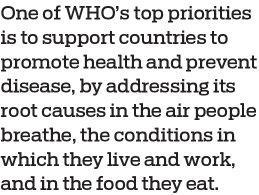Banish trans fat for good health
Trans fat is a killer: up to 500,000 people a year die worldwide from the consequences of eating it. Trans fat increases LDL(or "bad") cholesterol, the compound that clogs arteries and causes heart attacks and deaths from heart disease.
Most trans fat comes from artificial, industrially-produced Partially Hydrogenated Vegetable Oils (PHO), and is used in many baked foods, frying oils, fried foods and hardened fats, like margarine and vegetable ghee. They are cheap and increase the shelf life of processed food.
But they have no known health benefit and can be readily replaced with other ingredients to preserve taste and consistency. They do nothing but harm our hearts; in essence, they are the tobacco of food products.
And yet it would be so simple to eliminate them. PHO can easily be substituted with other vegetable oils that are healthier, no more expensive and taste good too, such as high-oleic vegetable oils.
In 2018, WHO called for the complete elimination of industrially-produced trans fat from the global food supply by the end of 2023. Since then, we have been supporting countries to implement policies prohibiting trans fat, and to replace it with healthier oils.
There are two best-practice policy alternatives. The first is a national limit of 2 grams of industrially produced trans fat per 100 grams of total fat in all foods. The second is a national ban on the production or use of partially hydrogenated oils (a major source of trans fat).
To date, more than 40 countries accounting for more than one-third of the world's population had implemented one of WHO's best-practice policies on trans fat.
A further 17 countries, with an additional 400 million people, are using less restrictive policies, but are still on a good path towards implementing WHO's package of recommended best practices.
This is remarkable progress, with an almost six-fold increase in the number of people protected by best-practice policies since the launch of the initiative. The results are clear. In Denmark, the first country to eliminate trans fat, studies show that after the introduction of the regulation in 2004, there was a decrease in mortality from heart disease.
However, time is of the essence if we are to achieve the goal of complete elimination by the year 2023.
Many nations are heading in the right direction. For example, the United States has passed a law banning the production and use of PHO in its food supply.
Increasingly, upper-middle- and lower-middle-income countries, such as Argentina, Bangladesh, India, Paraguay, the Philippines and Ukraine are also implementing these policies. Best-practice policies are also being considered in Mexico, Nigeria and Sri Lanka. If adopted, Nigeria would be the second and most populous country in Africa to put a best-practice trans fat elimination policy in place.
However, 9 of the 16 countries with the highest estimated proportion of coronary heart disease deaths caused by trans fat still do not have a best-practice policy in place: Australia, Azerbaijan, Bhutan, Ecuador, Egypt, Iran, Nepal, Pakistan and the Republic of Korea.
Governments play a key role in the elimination of trans fat, but to reach our goal it is essential to engage industry — the producers of raw materials and final food products.
By replacing industrial trans fat with healthier oils and fats in their products, food manufacturers, the food service sector and suppliers of oils and fats can help to protect people from the harms of trans fat, even in countries where national legislation is not yet in place. If they so choose, these companies could have an almost unparalleled impact on global health.
In 2019, the International Food and Beverage Alliance, representing several of the world's largest food companies, committed to eliminating trans fat from their products by the end of 2023. More recently, one of the world's largest producers of oils used in food, Cargill, committed to the same target. This is to be lauded. WHO is in contact with other producers, who we are encouraging to follow suit.
In addition to action by governments and industry, the work of civil society is also vital. One such organization, Resolve to Save Lives, plays an instrumental role in advocating the elimination of trans fat and advancing key policy changes in countries.
WHO is spearheading the global push towards elimination. Under the newly-established WHO Validation Programme for Trans Fat Elimination, WHO will recognize country successes in implementing best practice policy along with effective monitoring and enforcement.
One of WHO's top priorities is to support countries to promote health and prevent disease, by addressing its root causes in the air people breathe, the conditions in which they live and work, and in the food they eat. Prevention is not only better than cure, it's cheaper. Eliminating trans fat is therefore a powerful way of preventing heart disease and the massive costs it incurs for individuals, families and economies in medical treatment and lost productivity.
Food should be a source of health, not a cause of disease. It's time to banish trans fat to the dustbin of history.
The author is director-general of the World Health Organization.
The views don't necessarily represent those of China Daily.















